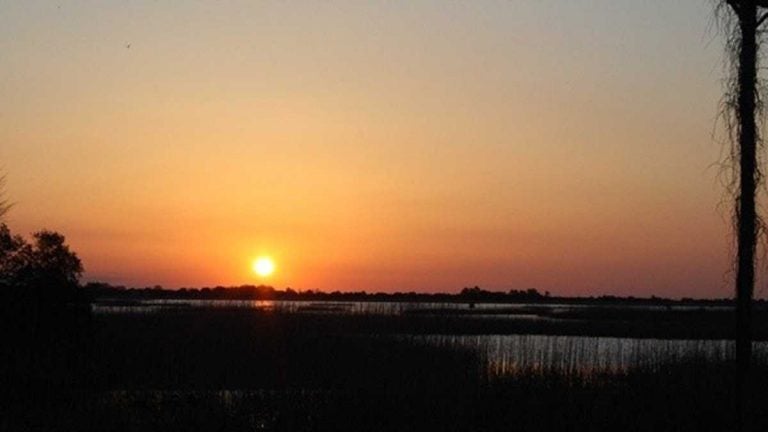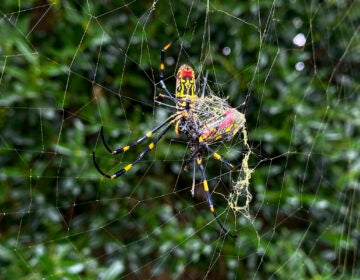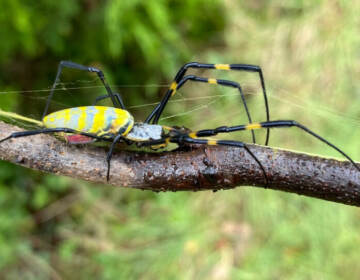Delaware's ecological task force is attempting to eliminate non-native and invasive plant species.
The snowy white Bradford Pear, the vibrant Burning Bush, the ascending English Ivy—they may be eye-catching, but they’re destroying the ecosystem.

(WHYY/Mark Eichman)
The snowy white Bradford Pear, the vibrant Burning Bush, the ascending English Ivy—they may be eye-catching, but they’re destroying the ecosystem.
A task force in Delaware is attempting to eliminate these non-native and invasive species in favor of protecting native plants and animals that are depleting.
“It’s a huge problem we’re all unaware of, but as soon as we become aware of it, and you see the extent of it and see how you can help bring about change—it’s empowering,” said state Sen. Stephanie Hansen, D-Middletown, who sponsored the resolution to create the state’s 19-member ecological task force.
Hansen sought to create the task force in response to a University of Delaware study reporting a significant decline in various species in the state. There are 78 percent fewer freshwater mussels; 20 percent fewer fish species; and 31 percent fewer reptiles and amphibians. In addition, 40 percent of all native plant species are threatened or exterminated and 41 percent of bird species that rely on forests are rare or absent.
In the U.S., one third of all wildlife species are at risk of extinction, according to the National Wildlife Association.
On Tuesday, members of the task force announced several recommendations to restore species populations and prevent further depletion. Much of the recommendations focus on phasing out the selling, buying and planting of non-native and invasive plants and the promotion of native plants.
University of Delaware Doug Tallamy said native plants are crucial to the survival of several species.
“Something like the Carolina chickadee, if it goes to reproduce it takes 6,000 to 9,000 caterpillars to make one clutch of chickadees. Those caterpillars come from plants that produce them. Plants protect themselves from insect damage by loading their tissues with nasty tasting chemicals. So only insects that have adapted to those chemicals can eat those plants,” he said.
“So when we bring in Bradford Pear from Asia it hasn’t been here long enough for any adaptation to take place so nothing can eat it. So it’s there, it’s sitting pretty in the landscape, it spreads and covers everything, but it’s not making any caterpillars so there’s no chickadees that can reproduce there—and that’s just one example. All the birds are using thousands of caterpillars to reproduce. If the birds don’t reproduce they’re not here. So using plants from other countries is equivalent to starving our birds. And that’s just one taxon, one group of organism. Insects are a critical component of every terrestrial food web that’s out there.”
What’s more, research from the Mt Cuba Center shows more than 70 percent of plants sold at locale wholesale and resale garden centers are non-native and invasive species. Less than 30 percent are native, they say.
“We found ourselves in this situation because we’re actively and unwittingly seeking out and selling and planting many of the worst culprits,” Hansen said.
The senator said education is a significant aspect of the task force’s 80 recommendations. Not only should school curriculum include ecological education, but homeowners, trade associations, landscapers, realtors and local governments should be educated on the dangers of non-native invasive plants, and the importance of native species, Hansen said.
The task force also recommends offering incentives for homeowners, nursery growers and others to cultivate native species. The group also would like the state to lead by example, and for the Department of Transportation to change its landscaping practices along highways and roads.
Finally, the task force wants the general assembly to pass legislation that gradually bans the sale of invasive plants over time.
Hansen said legislation will be needed to create a Delaware Native Species Commission to implement the recommendations. She said she wants to introduce the legislation early in the session that begins in January.
Sue Barton, president of the Delaware Nursery & Landscape Association, said nursery growers are becoming open minded about the elimination of invasive plants.
“When we first started talking about invasive plants with the industry folks were pretty resistant, ‘Well it’s not a problem in my backyard, and I want to be able to sell what I want to be able to sell,’ and that was definitely the attitude at first,” she said.
“But I think the nursery industry has come around to understanding the recommendations actually provide them with way more opportunity than negative impact—opportunity to re-landscape with native plants, opportunity to manage open space rather than just cut the grass, that requires a much more skilled person than somebody just riding on the back of a lawn mower. So I think the industry feels this is a good opportunity for them.”
Tallamy said homeowners also have a responsibility to preserve the ecosystem, and said even the smallest of properties can make a significant impact.
“If the plant is invasive, meaning it’s going to leave your property and spread and out-compete native plants, then think of that plant as a tumor and it’s going to spread throughout the environment. You don’t have the right to destroy the environment, even though you like it and it’s pretty,” he said.
“We have lots of pretty plants that are not invasive. What we need to do is create landscapes that support the life around us, we have to have pollinators at home, we have to sequester carbon at home, and we have to have viable food webs, all those breeding birds, at home, because if we don’t do it where humans are they’re all going to disappear, because humans are everywhere. So you can have your pretty plants, but you have to have your productive plants as well—and a lot of plants that are very beautiful, like giant oak trees, are the most productive plants we have.”
WHYY is your source for fact-based, in-depth journalism and information. As a nonprofit organization, we rely on financial support from readers like you. Please give today.




